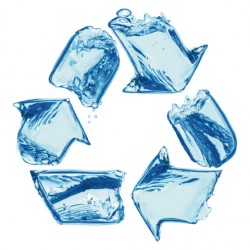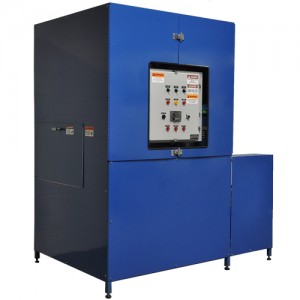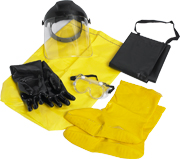We use cookies to make your experience better. To comply with the new e-Privacy directive, we need to ask for your consent to set the cookies. Learn more.
Green Battery Washing Practices for an Eco-Friendly Storage Facility

- Sulfuric Acid
- Lead
- Copper
- Rust (Iron Oxide) Particles
- Dirt and Organic Matter
In order to comply with green initiatives (along with federal, state and municipal environmental regulations), every storage facility needs to establish consistent practices for forklift battery wastewater disposal -- along with additional practices to contain splash and runoff during washes. The most ecologically friendly option is to clean and recycle all wastewater on site, dramatically reducing water usage while keeping groundwater safe.
Why Battery Washing is an Important Maintenance Task
If you’re thinking about limiting battery washes or avoiding the practice altogether, know that this isn’t a viable option. Washing is an indispensable part of battery maintenance.
Forklift batteries lose minuscule amounts of electrolyte during regular use, and over time, the acidic mix builds up. The acid acts as a conductor, causing constant, low-level electrical discharge. Even worse, the leakage can corrode battery terminals and shorten operating lifespan. Battery surfaces that carry a coating of electrolyte, however thin, are also a safety hazard capable of causing chemical burns on contact with bare skin.
By keeping all forklift batteries on a strict washing schedule, you can prevent these problems and extend the life of your battery fleet by up to 50 percent. Washing schedules will vary from one facility to the next, but the average lifting equipment battery requires thorough cleaning every three months.
Implementing Green Battery Washing Practices
Can operations wash their battery fleets without polluting the groundwater? Is there a way to conserve water while still meeting battery maintenance needs? With the right equipment, these are certainly attainable goals. Here are a few beneficial practices for keeping batteries clean and healthy while running a greener storage facility operation.
-
Protect battery maintenance staff.
In order to keep the environment safe, you have to start by protecting your workers. All staff involved in forklift battery washing should be fully trained and outfitted with personal protective equipment such as:
- Acid-Resistant Face Shields
- Chemical Splash Goggles
- HAZ-MAT Boots
- Acid-Resistant Gloves
- Acid-Resistant Aprons
Eye wash stations and battery spill kits should be located close by, as well.
-
Capture all splash and runoff.
The key to preventing pollution is containment. In any effective forklift battery washing system, you will find either an enclosed wash cabinet or an acid-resistant battery wash station with tall splash panels. These structures protect the water supply by capturing toxic wastewater and storing it in designated tanks for processing.
-
Create a closed loop.
The most efficient way to clean batteries while conserving water is to establish a closed loop between an enclosed wash cabinet and a recycling system. Both the BHS WRS and the BHS Recirculation/Neutralization System (RNS) can be connected to a wash cabinet, continuously washing batteries with the same recycled water. This automated system treats and filters water onsite, quickly removing contaminants while neutralizing pH levels. It also features alarm activation for additional reliability.

-
Recycle wastewater on-site.
Hiring a third-party service to haul away and process wastewater is possible, but costly, and the added carbon emissions limits the potential ecological benefit. Installing a complete water recycling device such as the BHS Wastewater Recycling System (WRS) allows an operation to reuse water for countless battery washes.
The WRS adjusts wastewater pH to a neutral level, then isolates and removes contaminants. The result is a pair of products: clean water and non-hazardous, landfill-safe sludge that quickly dries for conventional disposal.
Well-maintained forklift batteries last longer and draw less power to fully recharge. With eco-friendly battery wash equipment, your operation can compound the environmental benefits of an electric lift truck fleet with the efficiency gains of clean, long-lasting batteries -- all while conserving water and eliminating pollution.
References:
http://www.crownbattery.com/faqs
https://www.forkliftamerica.com/blog/charging-watering-cleaning-forklift-battery/
http://mhlnews.com/facilities-management/develop-battery-management-strategy
http://mhlnews.com/forklift-safety/proper-care-safety-and-maintenance-forklift-batteries

